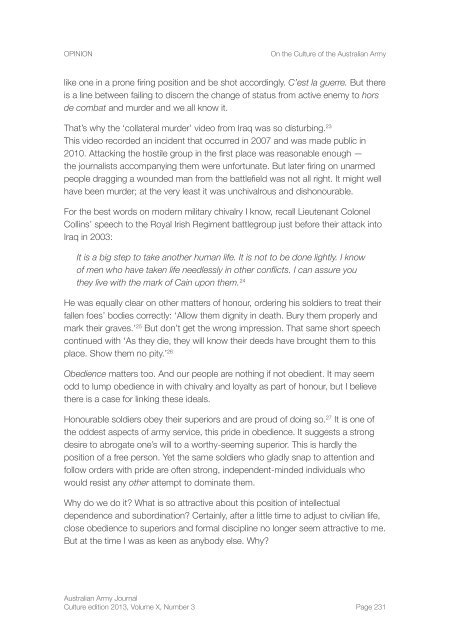Australian Army Journal
Australian Army Journal
Australian Army Journal
Create successful ePaper yourself
Turn your PDF publications into a flip-book with our unique Google optimized e-Paper software.
OPINION<br />
On the Culture of the <strong>Australian</strong> <strong>Army</strong><br />
like one in a prone firing position and be shot accordingly. C’est la guerre. But there<br />
is a line between failing to discern the change of status from active enemy to hors<br />
de combat and murder and we all know it.<br />
That’s why the ‘collateral murder’ video from Iraq was so disturbing. 23<br />
This video recorded an incident that occurred in 2007 and was made public in<br />
2010. Attacking the hostile group in the first place was reasonable enough —<br />
the journalists accompanying them were unfortunate. But later firing on unarmed<br />
people dragging a wounded man from the battlefield was not all right. It might well<br />
have been murder; at the very least it was unchivalrous and dishonourable.<br />
For the best words on modern military chivalry I know, recall Lieutenant Colonel<br />
Collins’ speech to the Royal Irish Regiment battlegroup just before their attack into<br />
Iraq in 2003:<br />
It is a big step to take another human life. It is not to be done lightly. I know<br />
of men who have taken life needlessly in other conflicts. I can assure you<br />
they live with the mark of Cain upon them. 24<br />
He was equally clear on other matters of honour, ordering his soldiers to treat their<br />
fallen foes’ bodies correctly: ‘Allow them dignity in death. Bury them properly and<br />
mark their graves.’ 25 But don’t get the wrong impression. That same short speech<br />
continued with ‘As they die, they will know their deeds have brought them to this<br />
place. Show them no pity.’ 26<br />
Obedience matters too. And our people are nothing if not obedient. It may seem<br />
odd to lump obedience in with chivalry and loyalty as part of honour, but I believe<br />
there is a case for linking these ideals.<br />
Honourable soldiers obey their superiors and are proud of doing so. 27 It is one of<br />
the oddest aspects of army service, this pride in obedience. It suggests a strong<br />
desire to abrogate one’s will to a worthy-seeming superior. This is hardly the<br />
position of a free person. Yet the same soldiers who gladly snap to attention and<br />
follow orders with pride are often strong, independent-minded individuals who<br />
would resist any other attempt to dominate them.<br />
Why do we do it? What is so attractive about this position of intellectual<br />
dependence and subordination? Certainly, after a little time to adjust to civilian life,<br />
close obedience to superiors and formal discipline no longer seem attractive to me.<br />
But at the time I was as keen as anybody else. Why?<br />
<strong>Australian</strong> <strong>Army</strong> <strong>Journal</strong><br />
Culture edition 2013, Volume X, Number 3 Page 231

















